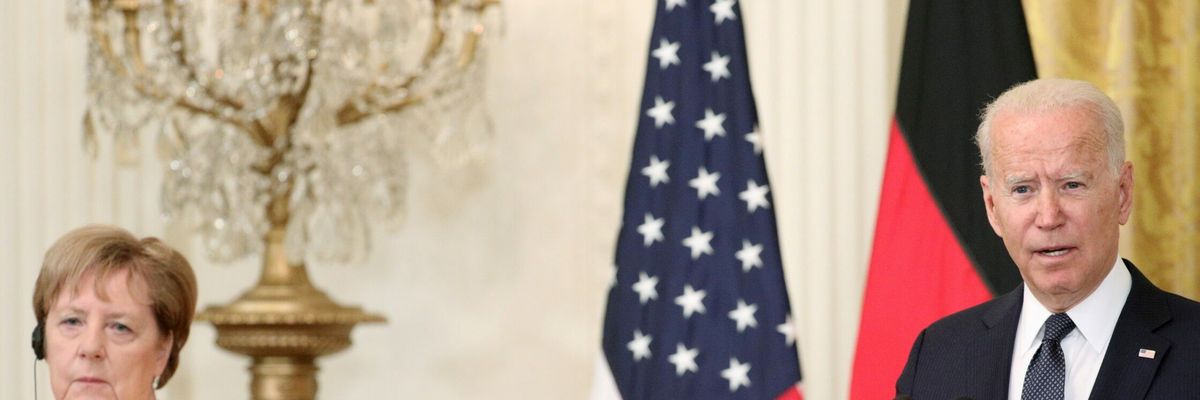The controversial deal on the Nord Stream 2 pipeline between the Biden administration and outgoing German Chancellor Angela Merkel comes at an awkward moment in German-American relations. While restoring America’s traditional European alliances has been a hallmark of President Biden’s foreign policy, tensions have remained high with Berlin. Fortunately, Merkel’s last months in office present the Biden administration with an opportunity to reset the German-American relationship and put diplomacy with Berlin on more pragmatic footing. The political deal to partially resolve disagreements over the Nord Stream 2 pipeline is a good first step. However, in order to put the relationship on the right track the Biden team must also pivot away from framing international politics as a contest between democracies and autocracies.
At first glance, the Biden administration's emphasis on global competition between democracies and autocracies would seem to have an intuitive logic. As both Biden and Merkel have remarked, both German and American politicians emphasize shared democratic values as crucial to their foreign policy. This narrative, however, hides key differences between German and American understandings of democracy and underestimates how badly the American brand has been damaged in German perceptions. Germans are fundamentally confident in their own democracy. In a recent cross-national survey of ten different countries conducted by the Eurasia Group Foundation, Germany ranked second in the number of respondents who believed that their country was democratic — 91 percent. Conversely, German opinions of American democracy are notably low. Fewer than a quarter of Germans approve of American democracy.
Biden would also be wise to de-emphasize his administration's confrontational policies towards Russia and China. Germans unequivocally support a U.S.-led world order over a Chinese-led world order — but only when forced to choose between the two. This preference papers over broader German disenchantment with American foreign policy. Two thirds of Germans surveyed by EGF felt that American foreign policy has either made little or no difference or made the world somewhat worse. In a separate survey by the European Council on Foreign Relations published earlier this year, strong majorities of Germans preferred neutrality when asked whether they would side with the United States in a conflict with China or Russia. Whoever becomes the next German chancellor is unlikely to prefer Moscow or Beijing over Washington, but the Biden team should understand that the German public will prefer neutrality when it is an option. Pressuring Merkel, and future German leaders, into anti-Russia or anti-China coalitions will force our German friends to answer tough questions about the German-American relationship that are best left unanswered while German trust in the United States remains so low.
The Biden administration appears to have learned this lesson at least partially on the issue of the Nord Stream 2 pipeline. The proposed pipeline would be built under the Baltic sea to bring Russian natural gas directly to Germany without passing through other countries, such as Ukraine, which charge transit fees. The Biden administration initially signaled that it would continue the Trump administration's aggressive opposition to the nearly completed project, aligning itself with objectors like Ukraine and Poland who have protested that the pipeline would only increase Russian influence in the region by bypassing established pipelines that run through Eastern and Central Europe. Chancellor Angela Merkel’s last visit to Washington in mid-July, however, resulted in a political deal with Biden on the issue. In return for the administration’s agreement to continue its suspension of congressional sanctions on the Nord Stream 2 project, Merkel has committed Germany to pressing Russia on renewing its energy transit deal with Kiev for another ten years. Both the Biden administration and Merkel have publicly stated that this deal does not overcome all differences, but it does acknowledge the reality that the United States could do little to stop the Nord Stream 2 pipeline from being completed.
That the Biden administration is shifting on an issue that is clearly important to Germany is promising in and of itself. But the very existence of the dispute points to a broader problem with Biden’s approach. From the beginning, his administration has been blind to how German attitudes towards the United States change how his message about competition between democracies and autocracies is interpreted in Berlin. By depending on broad narratives about the struggle between democracy and autocracy, the Biden administration has missed narrower tracks on which the two countries can make progress towards the same policy goals. The best example is climate change. EGF's May survey found that Germans cited action on climate change as the second most popular action that the United States could take to improve German perceptions of American democracy. Were the Biden administration to pursue bilateral cooperation with Germany on reducing both American and German reliance on carbon-emitting energy sources like natural gas, this course would both be popular with the German public and reduce German dependence on Russian energy.
The next several months present the United States with an opportunity to reset the relationship with a skeptical Germany. While immediate progress on areas of substantial disagreement between Berlin and Washington isn't likely, Biden can use the time remaining in Merkel's chancellorship to signal American good will and interest in partnership with Germany. Taking this approach will not immediately rebuild lost German trust in the United States. It will, however, reduce the cost that German politicians would have to pay for being perceived as working for Washington. This approach will also increase the likelihood that Merkel’s successor will honor the political deal, which is not a formal binding agreement, on the Nord Stream 2 pipeline. Reframing the German-American relationship as one based on mutual interests between equal partners, rather than Germany being drafted into a new Cold War, will go far in putting the Biden administration's relationship with the next German chancellor on the right foot.
















